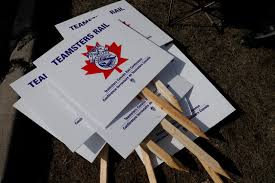Canada’s CPKC Expands Freight Embargoes Ahead of Looming Work Stoppage
In a strategic move to mitigate operational disruptions, Canadian Pacific Kansas City (CPKC) has significantly expanded its freight embargoes in anticipation of a potential work stoppage. The decision reflects the mounting tensions between the railway operator and its workforce, with potential repercussions for the Canadian and U.S. economies due to the pivotal role railroads play in goods transportation.
Background on CPKC and the Work Stoppage
CPKC, formed through the merger of Canadian Pacific Railway and Kansas City Southern, is a major player in North American freight transport. The company operates a vast network that spans from Canada through the United States and into Mexico, making it a crucial link in the supply chain for numerous industries.
The current labor unrest centers around contract negotiations between CPKC and its unions. Key issues include wage increases, working conditions, and job security. As negotiations have stalled, there is growing concern that a work stoppage could become imminent. This has prompted CPKC to take preemptive measures to limit the impact on its operations and maintain some level of control over the situation.
Table of Contents
Expansion of Freight Embargoes
Freight embargoes are measures taken by rail operators to halt the acceptance of certain types of cargo or shipments to manage operational challenges. CPKC’s recent decision to expand these embargoes is a direct response to the increasing likelihood of a work stoppage.

The expanded embargoes target a range of commodities, including but not limited to, agricultural products, automotive parts, and industrial goods. By restricting the acceptance of these shipments, CPKC aims to minimize the volume of goods affected if a work stoppage occurs, thereby reducing potential financial losses and operational chaos.
Implications for Industries and Supply Chains
The expansion of freight embargoes has significant implications for various sectors:
- Agriculture: Canada and the U.S. rely heavily on rail transport for agricultural products. A halt in these shipments could disrupt supply chains, affecting everything from grain exports to the delivery of livestock feed.
- Automotive Industry: The automotive sector depends on timely delivery of parts and components. Disruptions in rail transport could lead to production slowdowns or stoppages, impacting manufacturers and suppliers across the continent.
- Industrial Goods: Many industries rely on rail to transport raw materials and finished products. A work stoppage could lead to shortages and delays, affecting everything from construction projects to manufacturing operations.
Economic Impact
The potential work stoppage and expanded embargoes are likely to have far-reaching economic consequences. Rail transport is a critical component of the supply chain, and disruptions can lead to increased costs for businesses, delays in delivery, and ultimately, higher prices for consumers.
Economists warn that prolonged disruptions could strain supply chains, especially for industries already grappling with global challenges such as inflation and material shortages. The ripple effects could be felt across various sectors, leading to broader economic implications.
CPKC’s Strategy and Communication
CPKC’s decision to expand embargoes reflects a strategic approach to managing the potential fallout of a work stoppage. By curbing the flow of goods, the company aims to maintain some control over its operations and limit the extent of disruption.
The company has communicated its plans clearly to stakeholders, including customers and industry partners. CPKC is working to provide guidance on how businesses can manage their shipments and plan for potential disruptions. This proactive communication is intended to help stakeholders prepare for and mitigate the impact of any service interruptions.
The Path Forward
As negotiations between CPKC and the unions continue, the possibility of a work stoppage remains a critical concern. Both sides have been engaged in discussions, with attempts to find common ground and avoid a complete breakdown in operations.
Industry observers and stakeholders are closely monitoring the situation, hoping for a resolution that avoids significant disruption. In the meantime, businesses and industries affected by the embargoes are urged to review their supply chain strategies and consider alternative transportation options to minimize potential impacts.
Conclusion
The expansion of freight embargoes by CPKC underscores the seriousness of the labor dispute and the potential for a significant work stoppage. While the move aims to manage and contain the impact of such a disruption, the broader implications for industries and the economy are substantial. As the situation evolves, continued dialogue and negotiation between CPKC and its workforce will be crucial in finding a resolution and mitigating the effects on the North American supply chain.
Canadian Pacific Kansas City (CPKC) has expanded its freight embargoes in anticipation of a potential work stoppage due to stalled labor negotiations. The expanded embargoes affect various commodities, including agricultural products, automotive parts, and industrial goods. This preemptive measure aims to minimize operational disruptions and manage the impact on supply chains should a strike or work slowdown occur. CPKC’s move reflects the seriousness of the labor dispute and its efforts to control the potential fallout from a work stoppage.







